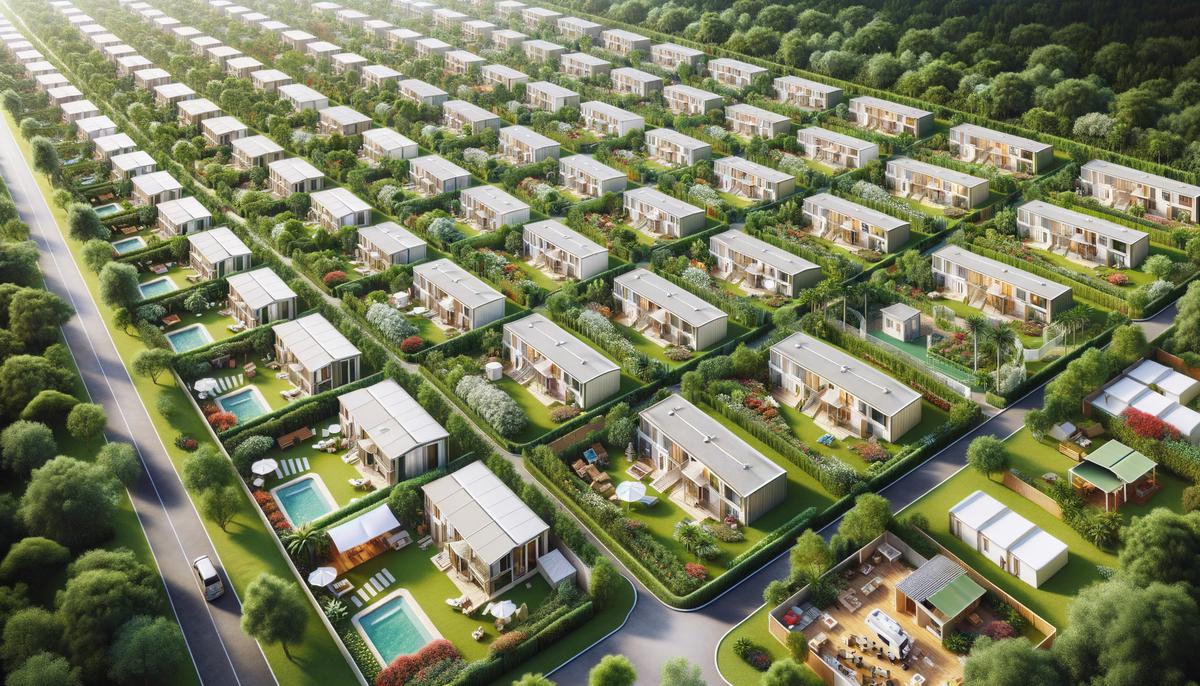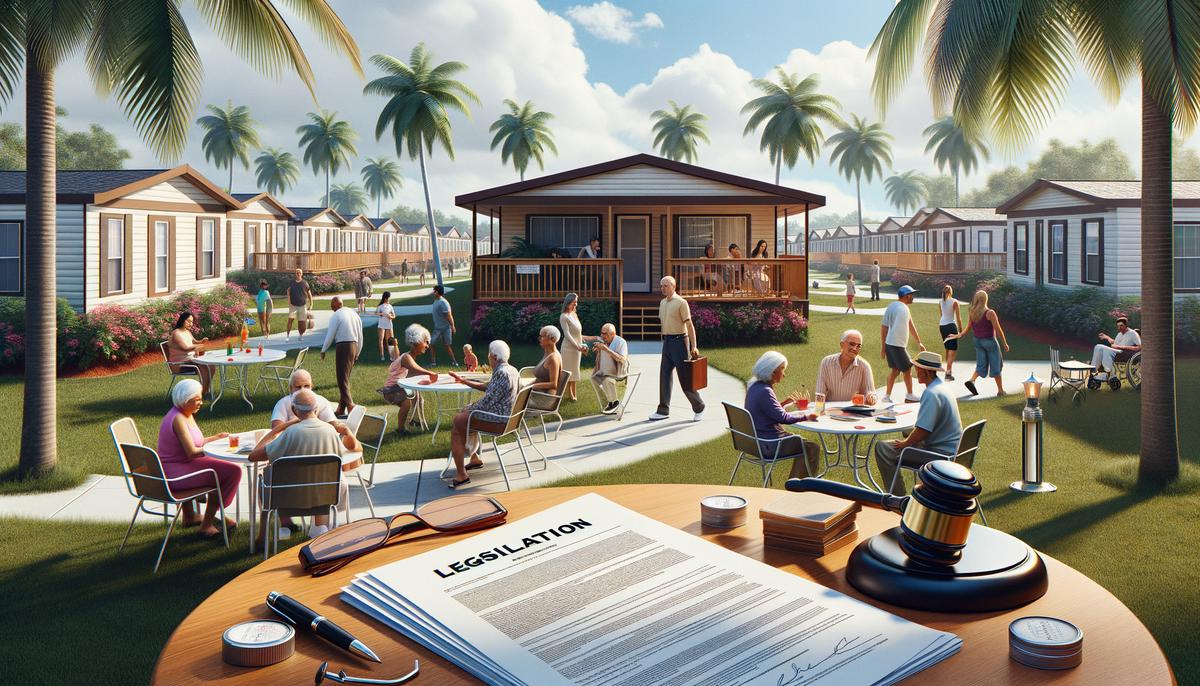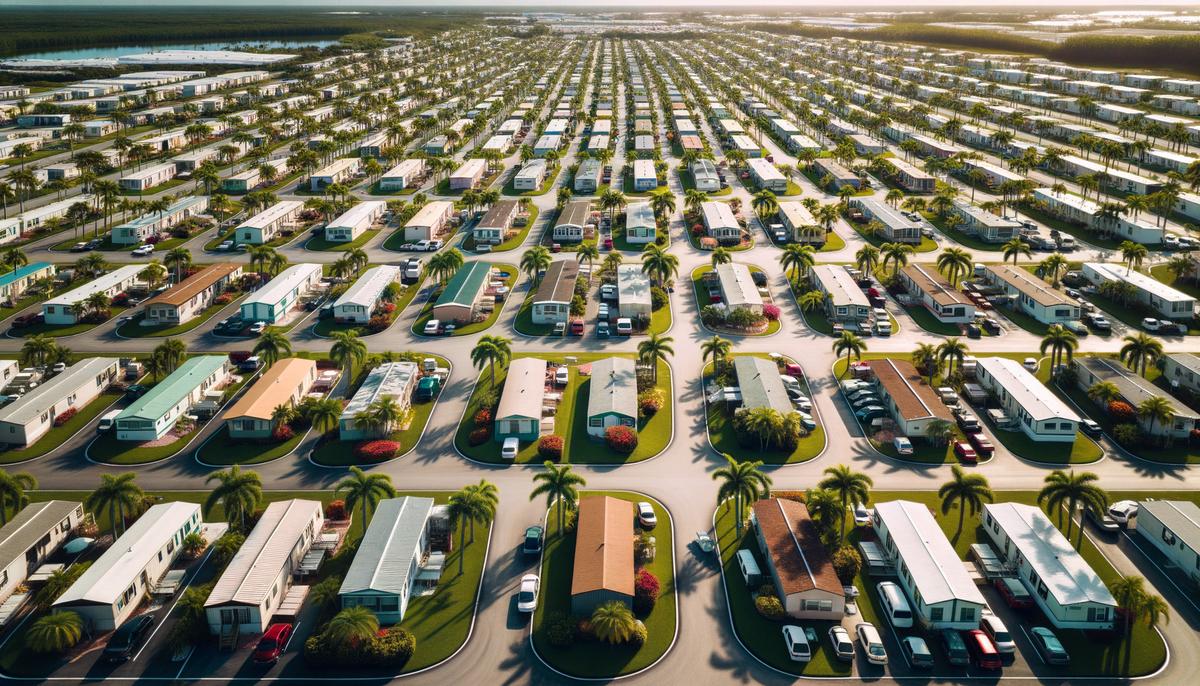Living in a mobile home park in Florida brings unique considerations, especially concerning land ownership. Whether one owns their mobile home but not the land, or lives in a resident-owned community, understanding these differences is crucial. This article explores the impact of land ownership on residents’ lives, financial security, and community dynamics, offering insight into the challenges and opportunities that come with mobile home park living in Florida.
Understanding Land Ownership in Mobile Home Parks
Navigating the world of mobile home park living in Florida brings its own unique set of considerations, especially when it comes to the question of land ownership. For many, the allure of living in a mobile home lies in the perceived affordability and flexibility. However, understanding the implications of land ownership, or the lack thereof, is crucial for residents who call these communities home.
In the traditional sense, owning a home usually means owning the land it sits on. This is not the case in many mobile home parks in Florida. Here, you might own your mobile home, but the land it occupies is rented. This arrangement leads to a situation where residents have control over their dwelling but not the ground beneath it.
Why does this matter? Control over the land can significantly impact your living environment and financial security. Landowners, often the park owners, dictate the rules of the park, including how much you pay in lot rent. Unfortunately, lot rents can increase, sometimes significantly, leaving residents in a precarious position. They face the tough choice of either accepting these hikes and adjusting their budget accordingly or relocating, a process that is both costly and challenging, given the mobile home’s name is somewhat misleading; they are not so easy to move.
Furthermore, the security of tenure is another concern for mobile home park residents in Florida. Leases provide some protection, but the landowner usually has the upper hand, with the ability to sell the land for redevelopment. Such scenarios can force residents to move, disrupting communities and leading to loss of home for some.
On the flip side, there are examples of resident-owned communities (ROCs) in Florida, where residents collectively own the land. This model offers a stark contrast, providing residents with more stability and control over rent increases. In ROCs, residents have a say in the governance and operation of the park, contributing to a more democratically run community. Though not without its challenges, this model provides a glimmer of hope and a potential path for those seeking more security in their living situations.
However, transitioning to a resident-owned model is not always feasible; it requires significant financial investment and organizational coordination among residents. The rarity of such opportunities means that many mobile home park residents continue to navigate the complexities of living on land they do not own.
Understanding the dynamics of land ownership in mobile home parks is essential for anyone considering this housing option in Florida. It influences everything from your financial planning to your sense of community and security. While mobile homes offer an affordable housing solution, the nuances of land ownership can present challenges that prospective and current residents need to consider carefully.

Legal Aspects and Restrictions
Delving deeper into the landscape of mobile home parks in Florida, it’s crucial to explore the role of state laws and regulations and how they specifically impact those who call these communities home. Florida, recognized for its considerable retirement population and affordable living options, has a unique legal framework surrounding mobile home parks, which affects land ownership and, by extension, the lives of the residents.
One of the key legislative pieces is the Florida Mobile Home Act. This act is designed to provide a basis for understanding the rights and responsibilities of both mobile home park owners and residents. While it does not alter the fundamental nature of land ownership within these parks, it sets guidelines for lease agreements, rent increases, eviction procedures, and the maintenance of common areas. Understanding this act is essential for residents who might not own the land under their homes but seek stability and a sense of control over their living environment.
Furthermore, the state mandates a notice period for rent increases and changes in lease terms, offering residents a buffer to adjust to new circumstances. However, despite these protections, the reality that the park owner controls the land can lead to significant increases in lot rent over time, driven by market conditions or redevelopment plans. Residents, especially those on fixed incomes, find themselves in a precarious position, balancing the cost of living with the desire for a stable community.
In response to these dynamics, Florida has also seen the evolution of statutes that facilitate the formation of resident-owned communities (ROCs). These laws provide a framework for residents to collectively purchase the land their homes occupy, thus transitioning from tenants to co-owners. This shift not only alleviates some of the insecurities associated with traditional mobile home park living but also fosters a more collaborative and empowered community environment. However, moving to a ROC structure is not without its challenges, ranging from the financial — the initial investment required — to the logistical — organizing a collective of residents with varying interests and resources.
Additionally, the State of Florida provides for a dispute resolution program, administered by the Florida Department of Business and Professional Regulation (DBPR), geared specifically towards mobile home parks. This program aims to mediate conflicts between park owners and residents, offering a less costly alternative to litigation and promoting a more harmonious living environment.
For prospective and current residents of mobile home parks in Florida, it becomes apparent that while the allure of affordable living and community is significant, navigating the complexities of land ownership, park management, and legal protections requires diligence and awareness. The landscape of mobile home park living in Florida is shaped deeply by the intricate dance between state laws, park regulations, and the collective action of residents. Engaging with this environment fully informed can lead to more secure and enjoyable living conditions, highlighting the importance of understanding both the opportunities and the obstacles inherent in this unique housing sector.

Financial Implications of Land Ownership
When you consider settling down in a Florida mobile home park, one of the first decisions you’ll face is whether to lease the land your home sits on or to dive into the world of land ownership. This choice carries both financial responsibilities and benefits, which are essential to understand as they will significantly influence your living experience and long-term financial planning.
Owning Land in a Mobile Home Park
Starting with land ownership, this option grants you complete control over your slice of earth. This control translates into a stable living environment where you’re shielded from unexpected lot rent hikes, which can be a common concern for those leasing land. It also means that the value of the land beneath your home could appreciate over time, offering you a potential financial windfall should you decide to sell in the future.
However, the initial cost is a considerable hurdle. Purchasing land requires a significant upfront investment, not to mention ongoing property taxes and maintenance costs. Additionally, being a landowner means you’re responsible for any environmental or zoning issues that may arise, which can add unforeseen expenses and legal complexities.
Leasing Land
On the flip side, leasing land in a mobile home park significantly reduces your upfront costs. You won’t need to secure a large sum of money to buy land, making it an attractive option for many. Leasing also frees you from the responsibilities of land maintenance and property taxes, which are typically the landowner’s burden.
Yet, the trade-off comes in the form of less control over your living situation. Leasing means you’re subject to the rules and regulations set by the park owner, including potential rent increases. While Florida law mandates notice periods for such increases, being in a leasing arrangement can still feel precarious, especially if the park changes ownership or the land is repurposed for development.
The Financial Perspective
From a financial viewpoint, owning land offers the benefit of a fixed cost—aside from usual tax and maintenance increases—potentially providing more predictability and security in your budgeting. More so, there’s the chance of land value appreciation. In contrast, leasing can initially seem like the more budget-friendly option, granting you flexibility and freeing up capital for other investments or expenses. However, it comes with the potential risk of escalating lot rents and the lack of equity growth associated with land ownership.
Making the Right Choice
Deciding whether to own or lease land in a Florida mobile home park ultimately hinges on your financial situation, long-term plans, and tolerance for risk and responsibility. Owning land offers stability and financial benefits tied to property appreciation but comes with a hefty initial cost and ongoing responsibilities. Leasing requires less upfront investment and carries fewer maintenance worries but might pose future financial uncertainties through rent increases and less control over your living conditions.
Whether you opt to buy or lease, understanding the full spectrum of financial responsibilities and benefits is paramount. By carefully weighing these factors against your personal and financial priorities, you’ll be better equipped to make a decision that aligns with your vision for your future in Florida’s mobile home park communities.

Challenges and Considerations
Navigating the terrain of mobile home park residency in Florida presents a unique set of challenges that go beyond the typical homeowner’s concerns. Residents often grapple with issues stemming from the intricacies of land tenure in these communities, which can impact their quality of life and financial stability. Let’s delve into some of these challenges that residents might face, keeping in mind the framework established in previous discussions.
One of the primary concerns for residents is the susceptibility to changes in park ownership and management. This change can bring about a shift in community norms and rules, potentially leading to conflicts between residents and new management. Residents may find themselves having to adapt to new regulations that weren’t part of their initial agreement, causing stress and uncertainty.
Moreover, the issue of repairs and maintenance of common areas and utilities is a significant challenge. In some parks, residents may encounter neglect or delays in repairs by the park owner, affecting their daily lives and safety. Access to reliable utilities, such as water, sewage, and electricity, is crucial, and residents may sometimes find themselves advocating for these essential services to be maintained to standard.
Another hurdle is related to the community dynamics and social cohesion within the park. Mobile home parks host a diverse population, and conflicts or disagreements can arise, impacting the community’s harmony. There may also be challenges in organizing or mobilizing residents to address issues collectively due to varying levels of engagement or interest in communal affairs.
The financial aspect of living in a mobile home park cannot be overlooked. While residents may not own the land their homes sit on, they are still subject to fees and charges that can fluctuate. Understanding the nuances of their lease agreements, especially concerning fee increases, termination clauses, and the right to sell or transfer ownership of their mobile home, is critical.
Residents wishing to sell their mobile homes might face obstacles as well. The park management has a say in who can move into the park, which can limit the pool of potential buyers for a resident looking to sell. This can lead to prolonged periods of trying to sell the mobile home or having to sell at a lower price than desired.
The environmental concerns associated with living in close proximity to others in a highly regulated space also pose challenges. Issues such as noise pollution, pet restrictions, and landscaping rules can significantly affect residents’ enjoyment of their living space. Moreover, being in a mobile home park means close quarters living, necessitating respectful neighborly relations to maintain peace and enjoyment for all.
In summary, while mobile home parks in Florida offer a unique living arrangement with its own set of benefits, residents must navigate a series of challenges. From dealing with changes in park management and ensuring the maintenance of common areas to fostering a cohesive community and managing financial obligations, residents need to be well-informed and proactive. Understanding the specific dynamics of land ownership and tenancy in mobile home parks is crucial for anyone considering this housing option or currently residing in one.

As we’ve seen, residing in Florida’s mobile home parks presents a distinct set of challenges and opportunities, heavily influenced by the nuances of land ownership. For residents, comprehending the implications of residing on leased land versus owning it outright is vital for financial planning, establishing a sense of community, and securing one’s living environment. Awareness and proactive engagement with these aspects can guide residents towards a more stable and fulfilling living experience in mobile home parks, making informed decisions crucial in this unique housing sector.
Writio: Your AI content writer for website publishers and blogs. Articles written by Writio.
Leave a Reply